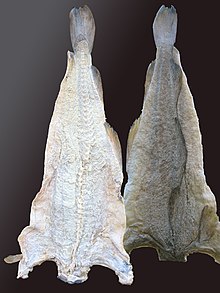Bacalhau
This article needs additional citations for verification. (March 2007) |

Bacalhau (Portuguese pronunciation: [bɐkɐˈʎaw]) is the Portuguese word for cod and—in a culinary context—dried and salted cod. Fresh (unsalted) cod is referred to as bacalhau fresco (fresh cod).
Portuguese and other cuisines
Bacalhau dishes are common in Portugal, and also in former Portuguese colonies like Cape Verde, Angola, Macau, Brazil, and Goa. There are said to be over 1000 recipes in Portugal alone and it can be considered the iconic ingredient of Portuguese cuisine (but curiously the only fish that is not consumed fresh in this fish-loving nation). It is often cooked on social occasions and is the Portuguese traditional Christmas Eve dinner in some parts of Portugal.
Similar recipes can be found across Europe. It is also found in the cuisines of other territories and regions like Dominican Republic and Puerto Rico. In Norway, where most of the salted and dried cod is produced, bacalao commonly refers to a specific dish prepared with salted and dried cod, potatoes, onions, tomatoes and olives. In recent years, there has also been increasing interest in the wider range of Portuguese dishes based on dried and salted cod, however.
Salted, dried cod usually comes from Norway (bacalhau da Noruega), Iceland (bacalhau da Islândia) or Newfoundland (bacalhau da Terra Nova). It used to be very affordable, but with the collapse of the cod stocks and dismantling of Portuguese bacalhoeiro fleet, it became more expensive, especially near Easter and Christmas time, since it is a part of many traditional dishes of the holiday season.
Cuisine
There are numerous bacalhau recipe variations, depending on region and tradition.In Portugal, it is said there are more than 365 ways to cook bacalhau, one for every day of the year; others say there are 1,001 ways[citation needed]. Whatever the exact number, bacalhau is a ubiquitous ingredient in Portuguese cuisine.
Bacalhau is often served with potatoes. Green (Vinho Verde) or mature wines (Alentejo Wine, Dão Wine, or Douro Wine) are served alongside.

Some Bacalhau dishes:
- Bacalhau com todos
- Bacalhau à Gomes de Sá (some varieties: Original, Porto)
- Bacalhau à Brás
- Bacalhau à Zé do Pipo
- Bacalhau com natas (Bacalhau with cream)
- Bolinhos de Bacalhau
- Bacalhau no Forno com Cebolada
- Bacalhau Suado à Lisboa
History
Salt cod has been produced for at least 500 years, since the time of the European discoveries of the New World. Before refrigeration, there was a need to preserve the cod; drying and salting are ancient techniques to preserve nutrients and the process makes the cod tastier. More importantly, fish low in oils and fats allow for the drying and preservation process to occur: oils and fats prevent the salt water from preserving the fish. Cod fish have very low levels of oils, and most is located in the guts.[1]
Portuguese, Norman, Breton, and English fisherman were the first to adopt the salt-based curing technique from Basque fishermen in Newfoundland near the cod-rich Grand Banks by the late 1400s.[2] By the 1700s, salted cod had become a staple food for ordinary Portuguese people and by upper levels of Portuguese society.[3] With the advancements in freezing and transportation in the 1900s, salted cod from North America declined and Iceland and Norway became the major supplier of the salted fish to Portuguese markets.[4] During this time bacalhau was a cheap source of protein and frequently consumed.[5] Thus, bacalhau became a staple of the Portuguese cuisine, nicknamed Fiel amigo (loyal friend).[6] In fact, there is no word in Portuguese for fresh cod, it is instead called "fresh salt cod".[7]
This dish is also popular in Portugal and other Roman Catholic countries because of the church. For example, the Church forbade the eating of meat on many days (Fridays, Lent, and other festivals), and so bacalhau dishes were eaten instead.[8] Bacalhau is also popular in Sfax where this dish is eaten in the first day of Eid ul-Fitr with chermoula.
In Portugal, bacalhau is often sold as a generic product with no brand information. Customers are free to touch, smell, and otherwise personally inspect the fish, which is very different to how fresh seafood is often sold.[9] Stores can cary a large variety of bacalhau differing in color, size, smell, taste, and dryness. Such variation has led Portugal to define requirements as to what products can cary the label "Bacalhau de Cura Tradicional Portuguesa".[10]
See also
Notes
- ^ "Bacalhau Salted Cod Fish Portugal". Lisbon-Portugal-Guide.com. Retrieved 8 June 2015.
- ^ Silva, p. 132
- ^ Silva, p. 133
- ^ Silva, p. 134
- ^ Mountinho, p 180
- ^ History of Portugal: Pamphlet Collection]. CUP Archive. 1937-01-01. p. 480.
- ^ Kurlansky, Mark (2011-03-04). Cod: A Biography Of The Fish That Changed The World. Knopf Canada. p. 37. ISBN 9780307369802.
- ^ "Um Alimento Milenar: O início do Bacalhau com os Espanhóis e os Vikings" [A Millennial Food : The beginning of the cod with the Spanish and the Vikings]. Retrieved 8 June 2015.
- ^ Ostli, Jens; Heide, Morten; Carlehog, Mats; Eilertsen, Guro (2006). "The importance of bacalhau consumption in Portugal and a preliminary product consumer test in Lisboa". Seafood research from fish to dish: quality, safety and processing of wild and farmed fish: 241–249. ISBN 978-90-8686-005-0.
- ^ "Publication of an application pursuant to Article 50(2)(b) of Regulation (EU) No 1151/2012 of the European Parliament and of the Council on quality schemes for agricultural products and foodstuffs". eur-lex.europa.eu. 10 August 2013. Retrieved 8 June 2016.
References
- Silva, António José Marques da (2015), "The fable of the cod and the promised sea: About Portuguese traditions of bacalhau" (PDF), in Barata, Filipe Themudo; Rocha, João Magalhães (eds.), Heritages and Memories from the Sea, Évora, Portugal: 1st International Conference of the UNESCO Chair in Intangible Heritage and Traditional Know-How: Linking Heritage
- Moutinho, Mário C (1985), História da pesca do bacalhau: por uma antropologia do "fiel amigo", Editorial Estampa
